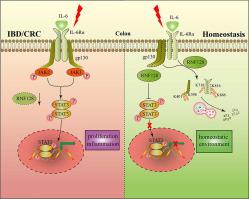E3 泛素连接酶 RNF128 通过触发 IL-6 受体的降解来减轻结肠炎和结直肠肿瘤的发生。
IF 11.4
1区 综合性期刊
Q1 MULTIDISCIPLINARY SCIENCES
引用次数: 0
摘要
简介肠道免疫失调与肿瘤的发生和形成密切相关。已发现RING指蛋白128(RNF128)在先天性和适应性系统中发挥着不同的免疫调节功能。然而,RNF128 在结肠炎和结直肠癌(CRC)等肠道炎症中的生理作用仍存在争议:阐明 RNF128 在结肠炎和 CRC 中的功能和机制:方法:在WT和Rnf128缺陷小鼠中建立右旋糖酐硫酸钠(DSS)诱导的结肠炎和偶氮甲烷(AOM)/DSS诱导的CRC动物模型,并通过组织病理学进行评估。共免疫沉淀和泛素化分析被用来研究RNF128在IL-6-STAT3信号转导中的作用:结果:与配对的瘤周组织相比,RNF128在临床CRC组织中明显下调。Rnf128缺陷小鼠对DSS诱导的结肠炎和AOM/DSS或APC突变诱导的CRC均有过敏反应。在体内和体外,当受到IL-6刺激时,RNF128的缺失会促进CRC细胞的增殖,并在癌变的早期转化阶段促进STAT3的活化。从机理上讲,RNF128与IL-6受体α亚基(IL-6Rα)和膜糖蛋白gp130相互作用,并以连接酶活性依赖的方式介导其溶酶体降解。通过一系列 IL-6 受体的点突变,我们发现 RNF128 促进了 IL-6Rα 在 K398/K401 处和 gp130 在 K718/K816/K866 处与 K48 链接的多泛素化。此外,阻断 STAT3 激活可有效消除 Rnf128 缺失小鼠在癌变转化阶段的炎症损伤:结论:RNF128通过抑制IL-6-STAT3信号传导来减轻结肠炎和结直肠肿瘤的发生,这为IL-6受体的调控和炎症向癌症的转化提供了新的见解。本文章由计算机程序翻译,如有差异,请以英文原文为准。

E3 ubiquitin ligase RNF128 attenuates colitis and colorectal tumorigenesis by triggering the degradation of IL-6 receptors
Introduction
Intestinal immune dysregulation is strongly linked to the occurrence and formation of tumors. RING finger protein 128 (RNF128) has been identified to play distinct immunoregulatory functions in innate and adaptive systems. However, the physiological roles of RNF128 in intestinal inflammatory conditions such as colitis and colorectal cancer (CRC) remain controversial.
Objectives
To elucidate the function and mechanism of RNF128 in colitis and CRC.
Methods
Animal models of dextran sodium sulfate (DSS)-induced colitis and azoxymethane (AOM)/DSS-induced CRC were established in WT and Rnf128-deficient mice and evaluated by histopathology. Co-immunoprecipitation and ubiquitination analyses were employed to investigate the role of RNF128 in IL-6-STAT3 signaling.
Results
RNF128 was significantly downregulated in clinical CRC tissues compared with paired peritumoral tissues. Rnf128-deficient mice were hypersusceptible to both colitis induced by DSS and CRC induced by AOM/DSS or APC mutation. Loss of RNF128 promoted the proliferation of CRC cells and STAT3 activation during the early transformative stage of carcinogenesis in vivo and in vitro when stimulated by IL-6. Mechanistically, RNF128 interacted with the IL-6 receptor α subunit (IL-6Rα) and membrane glycoprotein gp130 and mediated their lysosomal degradation in ligase activity-dependent manner. Through a series of point mutations in the IL-6 receptor, we identified that RNF128 promoted K48-linked polyubiquitination of IL-6Rα at K398/K401 and gp130 at K718/K816/K866. Additionally, blocking STAT3 activation effectively eradicated the inflammatory damage of Rnf128-deficient mice during the transformative stage of carcinogenesis.
Conclusion
RNF128 attenuates colitis and colorectal tumorigenesis by inhibiting IL-6-STAT3 signaling, which sheds novel insights into the modulation of IL-6 receptors and the inflammation-to-cancer transition.
求助全文
通过发布文献求助,成功后即可免费获取论文全文。
去求助
来源期刊

Journal of Advanced Research
Multidisciplinary-Multidisciplinary
CiteScore
21.60
自引率
0.90%
发文量
280
审稿时长
12 weeks
期刊介绍:
Journal of Advanced Research (J. Adv. Res.) is an applied/natural sciences, peer-reviewed journal that focuses on interdisciplinary research. The journal aims to contribute to applied research and knowledge worldwide through the publication of original and high-quality research articles in the fields of Medicine, Pharmaceutical Sciences, Dentistry, Physical Therapy, Veterinary Medicine, and Basic and Biological Sciences.
The following abstracting and indexing services cover the Journal of Advanced Research: PubMed/Medline, Essential Science Indicators, Web of Science, Scopus, PubMed Central, PubMed, Science Citation Index Expanded, Directory of Open Access Journals (DOAJ), and INSPEC.
 求助内容:
求助内容: 应助结果提醒方式:
应助结果提醒方式:


